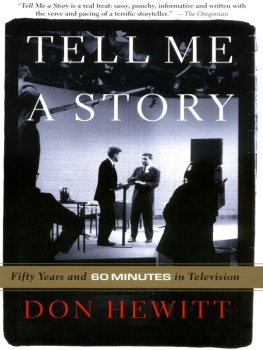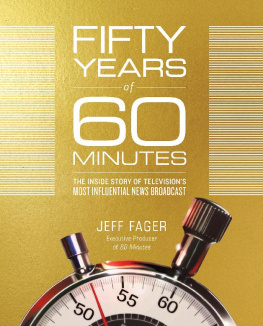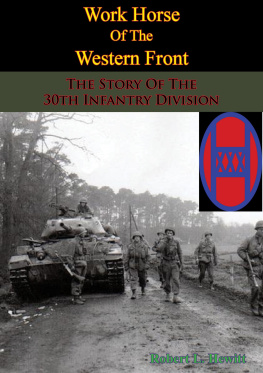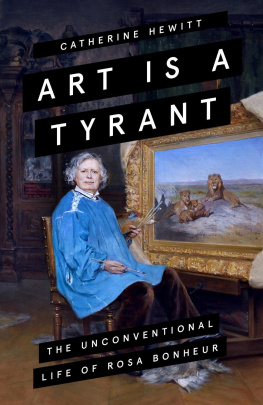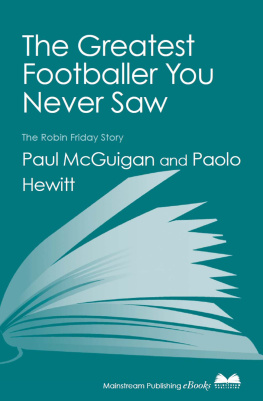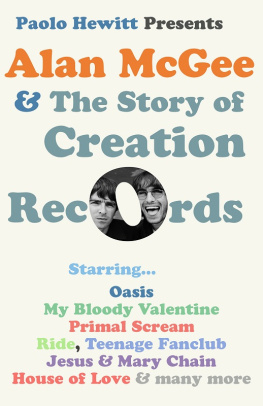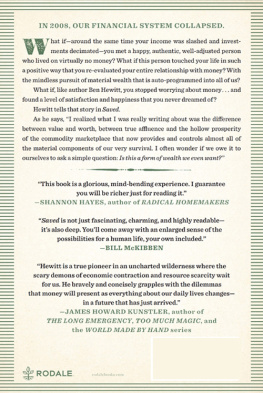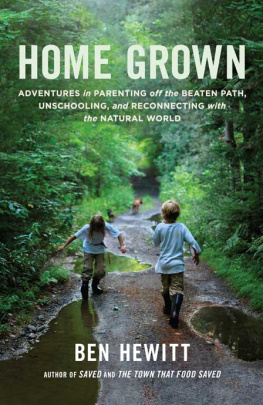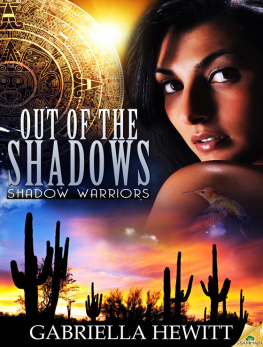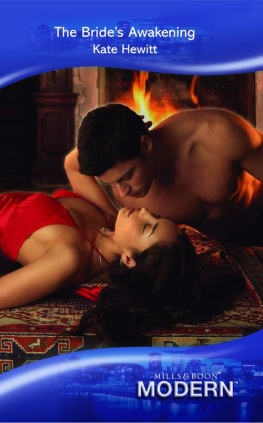Table of Contents
Copyright 2001, 2002 by Don Hewitt.
Published in the United States by PublicAffairs, a member of the Perseus Books Group. All rights reserved. Printed in the United States of America.
No part of this book may be reproduced in any manner whatsoever without written permission except in the case of brief quotations embodied in critical articles and reviews. For information, address PublicAffairs. 250 West 57th Street, Suite 1321, New York, NY 10107.
PublicAffairs books are available at special discounts for bulk purchases in the U.S. by corporations, institutions, and other organizations. For more information, please contact the Special Markets Department at The Perseus Books Group, 11 Cambridge Center, Cambridge MA 02142, or call (617) 252-5298..
Book design and composition by Mark McGarry. Set in Electra.
Library of Congress Cataloging-in-Publication Data
Hewitt, Don.
Tell me a story: fifty years and 60 minutes in television / Don Hewitt.
p. cm.
ISBN 1-58648-141-x (pbk)
1. Hewitt, Don. 2. Television producers and directorsUnited States-Biography. 3. 60 minutes (Television program) I. Title.
PN1992.4H49 A3 2001
791-450232092dc21
IBI 200101622
10 9 8 7 6 5 4 3 2 1
To Mike Wallace, the late Harry Reasoner, Morley Safer, Ed Bradley, Steve Kroft, Lesley Stahl, Andy Rooney, Bob Simon, Christiane Amanpour, Dan Rather, and (for a time) Diane Sawyer and Meredith Vieira, without whom there would have been no 60 Minutes.
And to Phil Scheffler, the late Palmer Williams, Merri Lieberthal, Esther Kartiganer, Josh Howard, Arthur Bloom, Vicki Gordon, Joe Illigasch, Robert Corujo, Joel Dulberg , Allan Wegman, the late Kenneth Dalglish, Beverly Morgan , and all the wonderful people who work with them and for them, without whom there would have been no Don Hewitt.
And to four CBS executives I relied on to keep me on an even keel when the wind blew too hard and the waves got too bigBillLeonard, Sig Mickelson, Howard Stringer, and Frank Stanton.
Finally, to Bill Paley, the legend who created CBS, made it the Tiffany Network, and became my dear friend.
Bless them, one and all.
Acknowledgments
D ont I have enough to do getting 60 Minutes on the air every Sunday? I thought so until Peter Osnos, the publisher of PublicAffairs, suggested to me that after a half-century in television in which I had seen it all and done it all, there had to be a book lurking inside me. After arguing that there wasnt, I came to the conclusion that there was. Peter would have had an easier time convincing me if I had known he was going to make available to me two of the best editors it has ever been my pleasure to work with: his own executive editor at PublicAffairs, Paul Golob, and the editor of the editorial page of the Milwaukee Journal Sentinel , Michael Ruby.
Id also like to acknowledge that I have included in this book stories that Ive told many times before to friends and family, some of which appeared in a book about 60 Minutes I wrote almost twenty years ago. Frankly, they are so much a part of me that they fall naturally into any telling of my career in journalism, and I hope no one will mind my repeating a few of them.
Prologue
T here probably are luckier people in the world, but I dont know them. My life has been blessed by good fortune, good friends, a wonderful family, great professional colleagues, and more luck than anyone has a right to expect. Ive even managed to reach that plateau called elder statesman without, I think, too much to be ashamed of.
I am keenly aware that you dont get where I got without some of what made Ed Murrow Ed Murrow, Walter Cronkite Walter Cronkite, and Mike Wallace Mike Wallace rubbing off on you. I am also keenly aware that 60 Minutes works because fate bestowed on me the most talented men and women in the broadcast news business and just enough good sense to know what to do with them. Ideas in television are a dime a dozen. People who can execute those ideas are a precious commodity, and the people of 60 Minutes are pure gold.
The formula is simple, and its reduced to four words every kid in the world knows: Tell me a story. Its that easy.
Before 60 Minutes, with the exception of Edward R. Murrows See It Now, the accepted wisdom was that television writers put words to pictures. Thats ass-backwards. What 60 Minutes is going to do, I said, is put the pictures to the words. If we dont do it that way, all were doing is writing captions.
Do we try to tell our stories with flair? You bet we dojust as the newsmagazines and newspapers do. Our ticking stopwatch and what has come to be known as teases at the beginning of 60 Minutes are the way we do it. Newspapers also use teases; only they call them headlines. Now, Ive never denied that theres some theatricality in the casting of our correspondents. For better or worse, thats been part of television news from the beginning: All other things being equal, it certainly helps if the man or woman in front of the camera looks the part.
Take Ed Murrow. He not only sounded authoritative on radio, he looked authoritative on television. And it didnt hurt that this very appealing man, almost a matinee idol, looked like Walter Pidgeon playing Ed Murrow. If you auditioned fifty actors to play him, and Murrow showed up as one of them, and youd never seen him before, hed get the part. You couldnt say the same about Lowell Thomas. Great voice, but Lowell Thomas didnt look the way Lowell Thomas sounded.
That Mike Wallace, Morley Safer, Ed Bradley, Steve Kroft, Lesley Stahl, and Andy Rooney look and sound right for 60 Minutes takes nothing away from their reporting skills. The way they look and sound enables them to establish a rapport with the audience that makes it easier for them to communicate. But its not enough to look and sound like a good journalist. You have to be a good journalist. And they are. If they werent, that ticking stopwatch would have stopped years ago.
The stories that 60 Minutes producers and correspondents find for real turn out to be as fascinating as anything television drama or the movies can cook up. Thats why hardly a Monday morning passes without a call from some Hollywood producer who wants to make a movie about someone he saw the night before on 60 Minutes, which tells me the stories we do are getting the two reactions I want from an audience: I didnt know that, and Wasnt that guy on 60 Minutes fascinating?
What follows is a frank and honest look at the world I have been a part of for more than half a century. I have been a television journalist almost from the beginning, and I have watched the news evolve from a service to a business.
Bill Leonard, who was the vice president in charge of 60 Minutes before he became president of CBS News, gave us our marching orders in 1968: Make us proud. Which may well be the last time anyone ever said make us proud to anyone else in television. Because Leonard said make us proud and not make us money, we were able to do both, which I think makes us unique in the annals of televisionso unique that in 1978, when someone said to me, You know, you guys are in the top ten. I said, The top ten what? I didnt know what in hell he was talking about. Back then, none of us who worked in news knew anything about ratings. It was not how we or the people we worked for measured what we were worth to the company.
Today, everyones consumed with ratings, and people in my businessthe TV news businessbitch constantly about the emphasis on Nielsen numbers and how its not only about journalism anymore. Lets stop kidding ourselves; of course it isnt. The anchors make millions of dollars a year, producers make hundreds of thousands a year and, yes, I make more money than I ever imagined I would. Where does everyone think the money comes from? Of course, its not only about journalism anymore. If it were only about journalism, they wouldnt pay these incredible salaries. But lets be fair about this, too. It was never entirely about journalism even in the good old days. William S. Paley of CBS, David Sarnoff of NBC, and Leonard Goldenson of ABC were businessmen, and the companies they headed were then and are today profit-making enterprises. The difference between then and now is that they were obliged to give something back in exchange for their use of the public airwaves. That was what the Federal Communications Commission demanded. So if news was a loss leader, that was the price of doing business.


